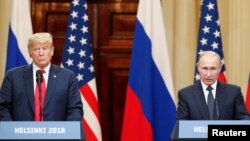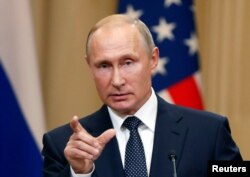The White House said Wednesday that the omission of a key exchange in a news conference by U.S. President Donald Trump and Russian President Vladimir Putin was unintentional and "by no means malicious."
Television news host Rachel Maddow reported on the MSNBC news network late Tuesday that in the transcript and audio recording of the news conference, the White House intentionally left out a question by Reuters reporter Jeff Mason related to the controversy about whether Putin wanted Trump to win the 2016 U.S. presidential election and interfered to help him claim the White House.
The U.S. reporter asked the Russian leader, "President Putin, did you want President Trump to win the election, and did you direct any of your officials to help him do that?"
Putin responded, "Yes, I did. Yes, I did, because he talked about bringing the U.S.-Russia relationship back to normal."
The Kremlin excised the entire exchange from its transcript of the news conference. In the White House version, the first portion of Mason's question was left out, regarding whether Putin wanted Trump to defeat his Democratic challenger, former Secretary of State Hillary Clinton.
The White House's video, published on its website, also appeared to leave out the exchange, leaving the U.S. media to speculate about whether the omission was intentional. The White House statement Wednesday said the omission was "by no means deliberate" and was due to the audio feed transcribed by a stenographer, in which the first half of the reporter's question was obscured by the voice of a translator giving Putin's answer to the previous question.
The Washington Post noted Wednesday that other recordings of the event exist in which Mason's question is not obscured by the translator and the exchange is heard clearly.
The problem, the Post concluded, was that the question took place while the audio feed switched from one in which the translator's voice was prominent to one in which the reporter's voice could be heard more clearly.
The Post said the existence of an alternate recording proved the White House's assertion that it had released the transcript as recorded and had not intentionally tried to edit the question out of existence.
Trump has only reluctantly acknowledged that Russia meddled in the election, while also calling it a "big hoax." He has adamantly rejected any contention that his campaign colluded with Russia, a topic of interest in U.S. special counsel Robert Mueller's ongoing criminal investigation.
On Tuesday, Trump contended, without offering any evidence, that Russia would support Democrats against Republican candidates in November's U.S. congressional elections.





